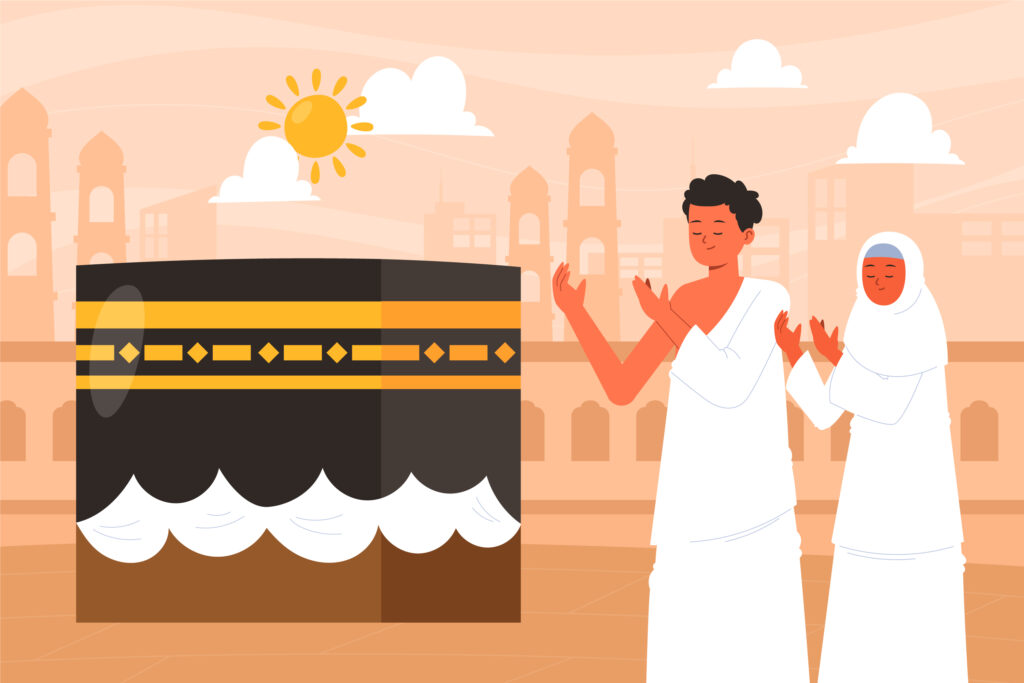Umrah, the lesser pilgrimage to Mecca, holds immense significance for Muslims around the world. Many individuals and families are preparing for their spiritual journey. To help you navigate the process and address any queries you may have, this article presents a comprehensive compilation of Umrah FAQs. From the rituals and requirements to logistical considerations and practicalities, we aim to provide you with the necessary information to embark on this sacred journey with confidence and clarity.
Umrah FAQs | Common FAQs
The most common FAQs about Umrah:
1. What is Umrah?
Umrah is a voluntary pilgrimage undertaken by Muslims to the holy city of Mecca. It involves specific rituals performed at various sacred sites, including the Kaaba, Safa and Marwa hills, and the Grand Mosque (Masjid al-Haram). Unlike the Hajj pilgrimage, which is obligatory and has specific dates, Umrah can be performed at any time of the year. While it holds immense spiritual significance, Umrah is considered a lesser pilgrimage and can be undertaken by Muslims from around the world.
2. How is Umrah Different From Hajj?
The Umrah and Hajj are both Islamic pilgrimages to Mecca, but they differ in their rituals, obligations, and timeframes.
Firstly, Umrah:
It is a voluntary pilgrimage that can be performed at any time of the year. Umrah involves a set of rituals, including Ihram (state of consecration), Tawaf (circumambulation) around the Kaaba, Sa’i (going between Safa and Marwa hills), and the trimming or shaving of hair. Umrah is not obligatory but carries great spiritual rewards.
Secondly, Hajj:
It is one of the Five Pillars of Islam and is an obligatory pilgrimage that takes place during specific days of the Islamic lunar calendar (Dhul-Hijjah). Hajj involves a comprehensive set of rituals, including standing on the plains of Arafat, symbolic stoning of pillars representing Satan, and sacrificing an animal. Hajj is a major pilgrimage that requires meticulous planning and is obligatory for financially and physically capable Muslims at least once in their lifetime.
3. Who Can Perform Umrah?
Unlike Hajj, Umrah is not obligatory and can be undertaken by both men and women at any age. There are no specific restrictions based on gender or nationality. However, it is important to note that children, elderly individuals, and those with health conditions should assess their physical capabilities and consult with medical professionals before embarking on the pilgrimage. It is advisable for children to be of an age where they can comprehend the significance of the journey and endure the physical demands.
4. What Are The Essential Rituals of Umrah?
The essential rituals of Umrah include:
- Ihram: Pilgrims enter the state of Ihram by wearing specific clothing (two seamless white sheets for men, and modest attire for women) and making the intention to perform Umrah.
- Tawaf: Pilgrims perform Tawaf by circling the Kaaba seven times in a counterclockwise direction.
- Sa’i: Pilgrims proceed to the hills of Safa and Marwa and walk seven times between them, emulating Hajar’s search for water for her infant son.
- Halq or Taqsir: After completing the Sa’i, men traditionally shave their heads completely (Halq), while women trim a small portion of their hair (Taqsir) as a symbolic act of purification.
These are the fundamental rituals of Umrah, but additional acts of worship, such as spending time in prayer and supplication, are highly encouraged throughout the pilgrimage.
Other Umrah FAQs
Some other FAQs about Umrah:
1. What Are The Visa Requirements For Umrah?
To perform Umrah, pilgrims need a valid Umrah visa issued by the Saudi Arabian authorities. The visa application process typically involves submitting necessary documents, including a valid passport, a completed application form, and a recent photograph. It is essential to ensure that your passport has a validity of at least six months beyond the date of entry into Saudi Arabia.
It is advisable to book your Umrah package through a reputable and licensed agency to ensure a smooth and hassle-free experience.
2. What Is The Best Time to Perform Umrah?
It can be performed at any time of the year, as there are no specific restrictions or fixed dates. However, certain periods are more popular due to favorable weather conditions and convenience. The month of Ramadan, in particular, is highly regarded for Umrah due to its blessed nature and the opportunity to perform Umrah during the holy month. Additionally, the months following Hajj (Muharram and Safar) see a decrease in the number of pilgrims, making it a less crowded time for Umrah.
3. What Are The Recommended Preparations For Umrah?
To ensure a smooth and fulfilling Umrah experience, it is essential to make thorough preparations. Some recommended preparations include:
- Knowledge and Education: Familiarize yourself with the rituals of Umrah by studying reliable sources, attending seminars, or seeking guidance from scholars. Understanding the significance and proper execution of the rituals enhances the spiritual experience.
- Physical Fitness: Engage in regular physical exercise to improve stamina and endurance. Umrah involves considerable walking and physical exertion, so being in good health will make the journey more comfortable.
- Packing Essentials: Prepare a checklist of necessary items such as comfortable clothing, toiletries, a first aid kit, an umbrella, a prayer mat, and any prescribed medications. It is advisable to pack lightly and carry essential items to ensure ease of movement.
- Financial Planning: Determine your budget and plan your expenses accordingly. Consider accommodation, transportation, meals, and additional expenses for souvenirs or charity.
- Accommodation and Transportation: Book accommodation near the Masjid al-Haram to minimize travel time and maximize convenience. Arrange transportation services, such as airport transfers and transportation between holy sites, through reliable travel agencies.
- Spiritual Preparation: Increase your devotion and engage in additional acts of worship, such as recitation of the Quran, voluntary prayers, and seeking forgiveness. Engaging in spiritual practices before Umrah helps create a mindset of humility and readiness for this sacred journey.
4. Can I Combine Umrah With a Visit To Other Destinations?
Many pilgrims choose to combine their Umrah pilgrimage with visits to other Islamic heritage sites and cities in Saudi Arabia. Popular destinations include Medina, where the Prophet’s Mosque is located, as well as historical sites like Mada’in Saleh and the Empty Quarter.
If you plan to visit other destinations, it is advisable to consult with your travel agency and include those locations in your itinerary. This allows for better planning of transportation, accommodation, and sightseeing activities. However, it is important to allocate sufficient time for the core rituals of Umrah and prioritize the spiritual aspects of the journey.
What Are The Dos And Don’ts During Umrah?
One of the most important Umrah FAQs is what to do and don’t do During Umrah. It is essential to observe certain etiquettes and follow guidelines to ensure a respectful and harmonious experience:
Firstly, Dos:
- Maintain a state of Ihram by adhering to the dress code and refraining from prohibited acts.
- Show respect and reverence towards the holy sites, including the Masjid al-Haram and the Kaaba.
- Perform the rituals with sincerity, devotion, and humility, seeking closeness to Allah.
- Be mindful of others and maintain a considerate attitude towards fellow pilgrims.
- Seek knowledge and understanding of the rituals to enhance the spiritual experience.
Secondly, Don’ts:
- Avoid engaging in any prohibited acts, such as arguing, fighting, or engaging in worldly distractions during the pilgrimage.
- Refrain from causing inconvenience to others, such as pushing or rushing in crowded areas.
- Do not waste water or other resources, as conservation is encouraged during the pilgrimage.
- Avoid taking photographs or using electronic devices in prohibited areas, such as inside the Grand Mosque.
- Do not engage in any commercial activities or transactions within the holy sites.
Conclusion
In conclusion, As you prepare for your Umrah pilgrimage in 2023, addressing common questions and concerns will help you embark on this spiritual journey with confidence and clarity. By understanding the rituals, requirements, and practicalities associated with Umrah, you can ensure a fulfilling and meaningful experience. Remember to seek guidance from trusted sources, follow the guidelines set by authorities, and approach the pilgrimage with sincerity and devotion. May your journey to the holy city of Mecca be blessed and may you return with a renewed sense of spirituality and connection to your faith.






